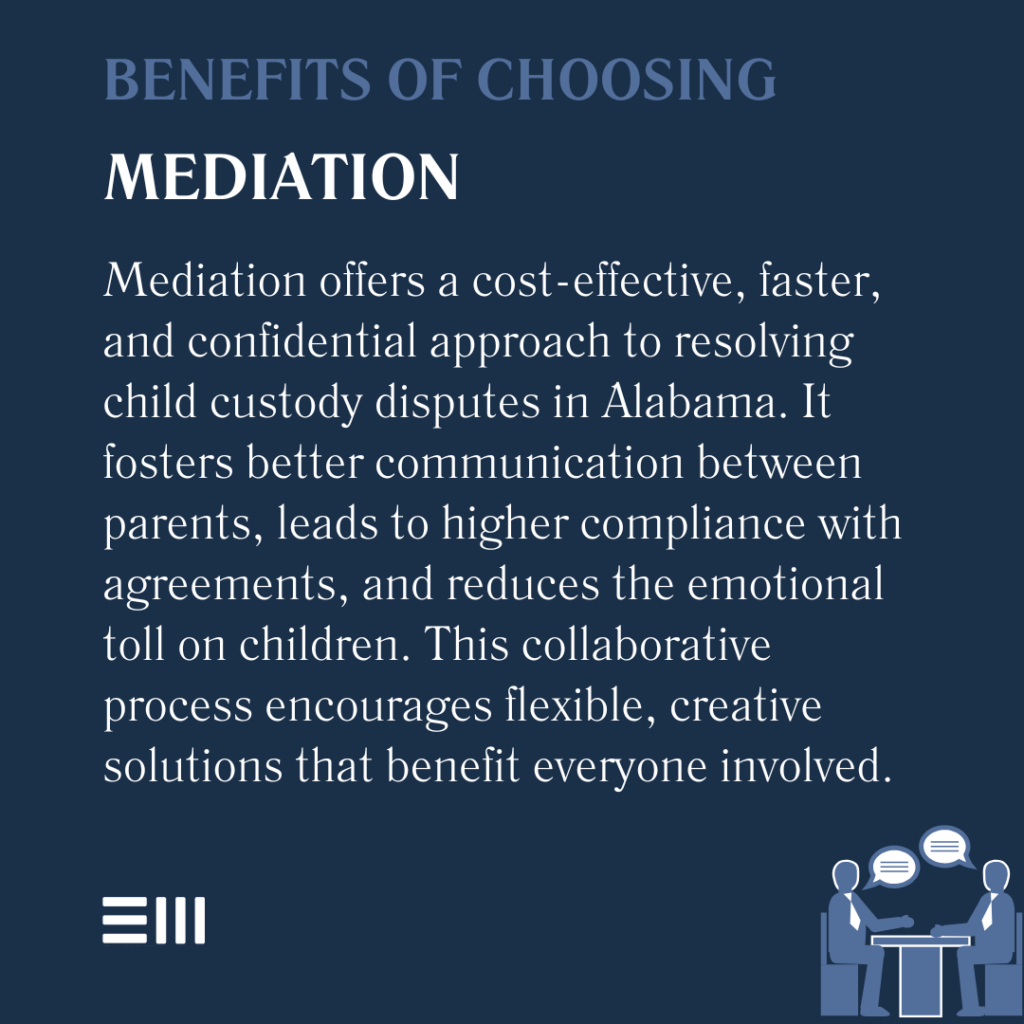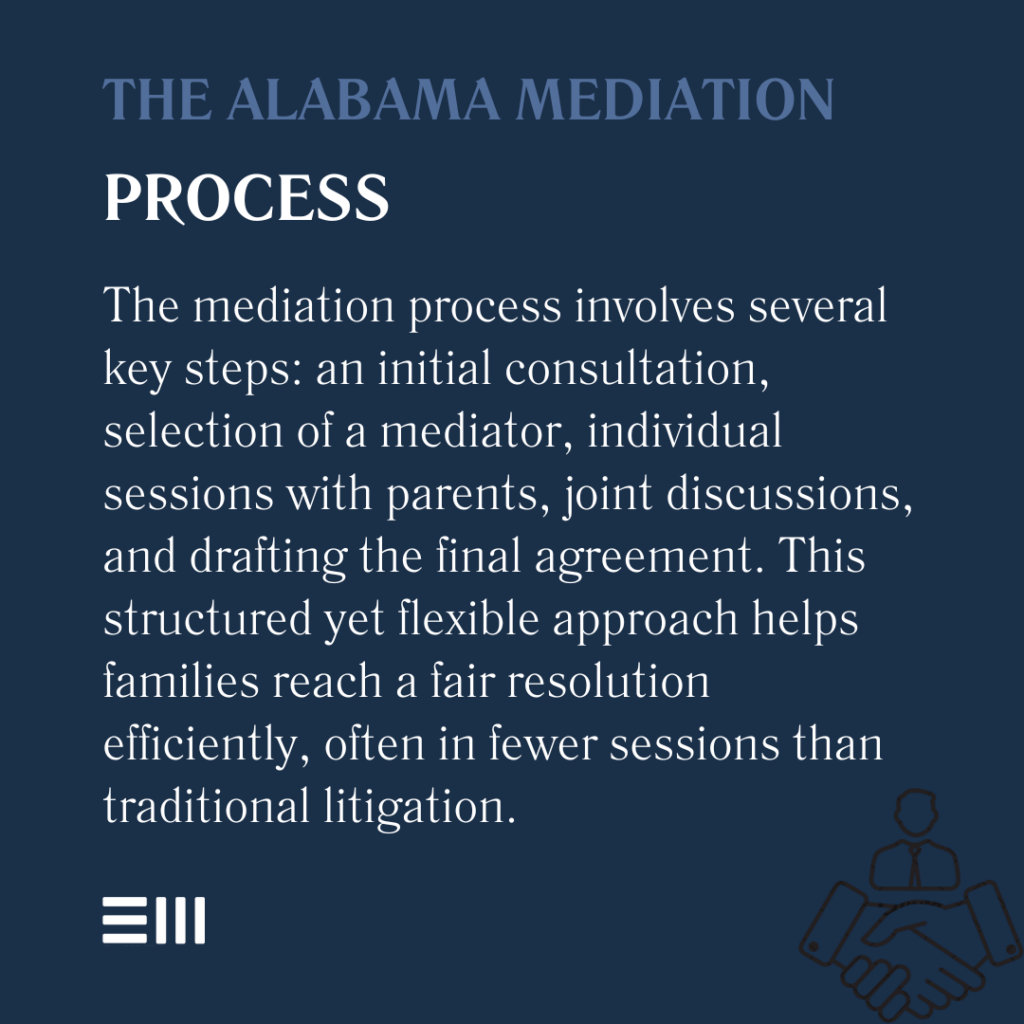
Behind the closed doors of Alabama courtrooms, families once spent months—sometimes years—battling over custody arrangements.
Today, these same families are discovering a different path. In a sunlit conference room in Birmingham, parents who haven’t spoken in months find common ground over coffee and conversation.
A Montgomery mother and father sketch out holiday schedules together, guided by a skilled mediator who helps transform tension into productive dialogue.
These scenes, playing out across Alabama, represent a quiet revolution in how families resolve custody disputes.
Understanding Mediation in Alabama Custody Cases
Mediation offers Alabama families a collaborative approach to resolving custody disputes outside the traditional courtroom setting.
In Alabama’s family court system, mediation has emerged as a cornerstone of modern custody resolution, providing parents with greater control over their children’s future while preserving family relationships.
Many Alabama judicial circuits now require parents to attempt mediation before proceeding to trial, recognizing that parents who work together to create their own agreements typically demonstrate higher satisfaction and better long-term outcomes for their children.
Before exploring specific aspects of mediation, consider these foundational elements:
- Neutral third-party facilitation of negotiations;
- Confidential discussions in a private setting;
- Focus on mutual problem-solving rather than confrontation;
- Flexibility to create customized custody arrangements; and
- Opportunity to maintain control over final decisions.
The mediation process empowers parents to craft solutions that truly serve their children’s best interests, often achieving outcomes that court orders alone cannot provide.
Benefits of Choosing Mediation
Understanding the advantages of mediation helps parents make informed decisions about their custody dispute resolution approach.
Consider these key benefits that Alabama families have discovered through mediation:
- Significantly lower costs than traditional litigation;
- Faster resolution of custody disputes;
- Greater privacy and confidentiality;
- Improved communication between parents;
- Higher rates of compliance with agreements;
- Reduced emotional impact on children; and
- More flexible and creative solutions.
These advantages make mediation an increasingly popular choice for Alabama families seeking a peaceful resolution to custody disputes.

The Alabama Mediation Process
Each mediation journey follows a structured yet flexible path designed to promote understanding and agreement.
The typical process includes:
- Initial consultation and screening;
- Selection of a qualified mediator;
- Gathering relevant information and documents;
- Individual sessions with each parent;
- Joint mediation sessions;
- Draft agreement preparation;
- Review by attorneys; and
- Final agreement submission to court.
Understanding these steps helps parents approach mediation with confidence and realistic expectations about the process ahead.

Role of the Mediator
Alabama mediators serve as neutral guides through the custody resolution process. These professionals combine extensive training in negotiation techniques with deep knowledge of Alabama family law to help parents reach workable agreements.
While mediators cannot provide legal advice or make decisions for parents, they excel at helping parties identify common ground and explore creative solutions. Their responsibilities include:
- Facilitating productive communication;
- Identifying areas of agreement and conflict;
- Suggesting creative solutions;
- Maintaining balance between parties;
- Documenting agreements reached; and
- Ensuring focus on children’s best interests.
Professional mediators bring expertise in both family law and conflict resolution to help parents navigate complex custody discussions.
Preparing for Mediation
Success in mediation often depends on thorough preparation.
Parents should consider these essential steps:
- Gather relevant documentation;
- Identify priority issues and concerns;
- Consider various custody schedule options;
- List questions and topics for discussion;
- Prepare financial information if relevant;
- Review current custody arrangements; and
- Document children’s schedules and needs.
Proper preparation enables parents to participate fully and confidently in the mediation process.
Common Challenges and Solutions
Mediation participants often encounter similar obstacles on their path to agreement.
Here are effective strategies for common challenges:
- Address communication barriers early;
- Focus on present and future rather than past conflicts;
- Take breaks when emotions run high;
- Use “I” statements instead of accusations;
- Keep children’s needs at the forefront;
- Stay flexible and open to compromise; and
- Seek clarification when needed.
Understanding these challenges helps parents navigate the mediation process more effectively.
Frequently Asked Questions About Mediation in Alabama Child Custody Disputes
Parents beginning the mediation process often share common concerns and questions.
Here are answers to help you understand what to expect:
What Makes a Mediator Qualified in Alabama?
Alabama requires mediators handling custody disputes to complete specific training and registration with the Alabama Center for Dispute Resolution.
This includes completing a 40-hour professional mediation training course, observing multiple mediations, and maintaining professional liability insurance. Additionally, custody mediators must complete specialized domestic relations training and demonstrate expertise in family law matters.
They must maintain ongoing education credits and adhere to strict ethical standards established by the Alabama Supreme Court Commission on Dispute Resolution.
How Long Does Mediation Usually Take?
Most custody mediations in Alabama require 2-4 sessions, typically spanning 4-8 weeks. Each session usually lasts between two and three hours, allowing time for meaningful discussion while preventing emotional exhaustion.
Complex cases involving multiple issues or high-conflict situations may require additional sessions, but mediation generally resolves disputes faster than litigation, which can take 6-18 months to reach resolution.
Parents can often schedule sessions around their work commitments, making the process more convenient than court appearances.
What if We Can’t Reach an Agreement?
Parents retain their right to pursue litigation if mediation doesn’t result in a full agreement. Partial agreements can still simplify subsequent legal proceedings.
Are Mediation Agreements Legally Binding?
Once approved by the court, mediated agreements carry the same legal weight as any other court order. The agreement becomes part of your official custody order, making it fully enforceable under Alabama law.
Both parents must comply with the terms or face legal consequences, including potential contempt of court charges.
However, unlike a verdict imposed by a judge, mediated agreements can often be modified more easily if both parties agree to changes as circumstances evolve.
This flexibility, combined with the fact that parents helped create the agreement, typically results in better voluntary compliance and fewer enforcement issues.
Transform Your Child Custody Journey Through Mediation
Every step toward a peaceful resolution creates a better future for your children.
Our experienced team has guided countless Alabama families through successful custody mediations, helping them build stronger co-parenting relationships and achieve lasting agreements.
Contact us today to explore how mediation can help your family find a positive path forward in your custody journey.
Can't find what you're looking for? Search our site below.










